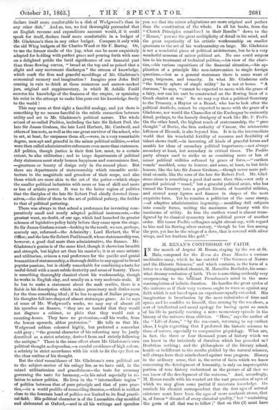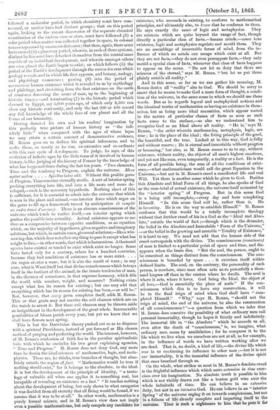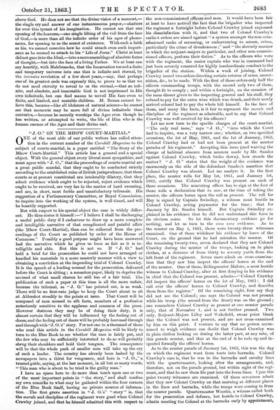M. RENAN'S CONFESSION OF FAITH.
TN the month of August M. Renan, staying by the sea at St. 1 Maio, composed for the .Revue des Deus illoades a curious meditative essay, which he has entitled "The Sciences of Nature and the Historic Sciences," and which contains, in the form of a letter to a distinguished chemist, M. Marcellin Berthelot, his some- what dreamy confession of faith. There is something evidently very overpowering to the brilliant Frenchman's mind in the mere contemplation of infinite duration. He handles the great cycle of the universe as if their very vastness ought to warn us against any faith which is not based upon an experience equally extended. His imagination is browbeaten by the mere infinitudes of time and space, and he confides to himself, thus musing by the sea-shore, a sort of intellectual and moral apology for having spent so much of his life in partially rescuing a mere momentary episode in the history of the universe from oblivion. " Here," says the author of the " Life of Jesus," "by the sea-coast, returning to my earliest ideas, I begin regretting that I preferred the historic sciences to those of nature, especially to comparative physiology. What are, in fact, the three or four thousand years of history which we can know in the infinitude of duration which has preceded us? Doubtless nothing ; and the philosophers of the literary school, hostile or indifferent to the results yielded by the natural sciences, will always have their minds closed against true progress. History in the ordinary sense, that is, the series of facts which we know concerning the development of humanity, is only an• imperceptible portion of true history understood as the picture of all that we can know of the development of the universe." And, accordingly, M. Renan recalls with his wonted art the vast procession of ages of which we may glean some partial if uncertain knowledge. He reminds his chemist correspondent that the first ages of natural existence must have been the ages of mere mechanic atoms, that is, of forces " divested of every chemical quality," but " containing the germ of all that was to follow ;" that on this (2) must have
followed a molecular period, in which chemistry must have com- menced, or matter have had distinct groups ; that on this period again, looking to the recent discoveries of the separate chemical constitution of the various suns or stars, must have followed (3) a solar period when matter was collected together in space, in colossal masses separated by enormous distances ; that then, again, there must have ensued (4) a planetary period, wherein, in each of these systems, distinct bodies must have detached themselves from the central mass capable of an individual development, and wherein amongst others our own planet the Earth began to exist; on which follows (5) the period of the Earth's development through the succes,ive eras which geology reveals, and in which life first appears, and botany, zoology, and physiology commence ; passing (6) into the period of unconscious human existence which is revealed to its by mythology and philology, and stretching from the first existence on the earth of creatures deserving the name of man, up to the beginning of historic times ;—and terminating (7) in the historic period which dawned in Egypt, say 5,000 years ago, of which only 2,500 can show any historic continuity, and only the last 300 or 400 record any full knowledge of the whole fade of our planet and all the forms of our humanity.
!laving daunted his own and his readers' imagination by this perfectly true picture of human history as " the infi- nitely little " when compared with the ages of whose lapse we may attain a certain amount of demonstrative evidence, M. Renan goes on to deduce his spiritual inferences, and to make them, as nearly as he can, co-extensive and co-ordinate with this vast cycle of development. To judge, he says, of this evolution of infinite ages by the little term of it involved in hunian history, is like judging of the history of France by the knowledge of what has happened there during the last ten years. "Two elements, Time and the tendency to Progress, explain the universe. illens • agitat molem . . . . Spiritus intus alit. Without this prolific germ of Progress, Time remains eternally sterile. A sort of interior spring pushing everything into life, and into a life more and more de- veloped,—such is the necessary hypothesis. Nothing short of this is sufficient, for it is essential to admit into the universe that which is seen in the plant and animal,—an interior force which urges on the-germ to fill up a framework traced by anticipation (it remplir un cadre trace d'acance). There is an obscure consciousness of the universe which tends to realize itself,—an interior spring which pushes the possible into actuality. Actual existence appears to me thus as a compromise between opposite conditions, as an equation which, on the majority of hypotheses, gives negative and imaginary solutions, but which, in certain cases, givesreal solutions;—like a win- nowing-fan, which does not allow anything to pass it except what has a right to live,—in other words, that which is harmonious. A thousand species have existed or tended to exist which exist no longer. Some have lasted only for a century, others for a hundred centuries, because they had conditions of existence less or more strict. . . . An organ creates a want, but it is also the result of want ; in any case, what is Want itself but that divine consciousness which betrays itself in the instinct of the animal, in the innate tendencies of man, in the dictates of conscience, in that supreme harmony, which fills the world with number, weight, and measure? Nothing exists except what has its reason for existing ; but one may add that everything which has its reason for existing has been,—or will be." Not, however, that every germ completes itself, adds M. Renan. This or that grain may not survive the evil chances which are on the watch to arrest it. But these evil chances may be thrown aside as insignificant in the development of the great whole. Innumerable possibilities of bloom perish every year, but yet we know that we shall have flowers next spring.
This is but the Darwinian theory pushed out so as to dispense with a spiritual Providence, instead of put forward as His chosen method of purging and perfecting the world. The interest, however, of M. Renan's confession of faith lies in the peculiar spiritualistic halo with which he encircles his two great explaining agencies, Time and Progress." M. Renan does not deny God, any more than he denies the ideal sciences of mathematics, logic, and meta- physics. These are, he thinks, true branches of thought, but abso- lutely outside the region of fact. "Mathematics would be true if nothing should exist," for it belongs to the absolute, to the ideal. It is but the development of the principle of identity, " a tauto- logy of valuable aid when one applies it to something real, but incapable of revealing an existence or a fact." "It teaches nothing about the development of being, but only shows in what categories it was decided from all eternity that all Being would be found, if we assume that it was to be at all." In other words, mathematics is a purely formal science, and in M. Renan's view does not imply even a possible mathematician, but only compels any candidate for existence, who succeeds in existing, to conform to mathematical principles, and ultimately also, to know that he conforms to them. He says exactly the same of logic and metaphysics. They are sciences which are quite beyond the range of fact, though directly a particular class of facts,—human minds,—come into existence, logic and metaphysics regulate and mould them. They are an assemblage of immutable forms of mind, from the in- fluence of which no minds can escape which exist at all. But they are not facts,—they do not even presuppose facts,—they only mould a special class of facts, whenever that class of facts happens to appear on the scene. " Do not let us deny that there are sciences of the eternal," says M. Renan, "but let us put them plainly outside all reality."
And in this sense, so far as we can gather his meaning, M. Renan denies all " reality " also to God. We should be sorry to assert that he means to make God a mere form of thought, a condi- tion of the universe, in the same sense in which we should use these words. But as he regards logical and metaphysical notions and the identical truths of mathematics as having-no existence in them- selves, but as being mere ideal necessities, which appear rooted in the nature of particular classes of facts so soon as such facts come to the surface,—so also we understand him to recognize God as an Ideal above all reality. " He is," says M. Renan, " the order wherein mathematics, metaphysis, ,logic, are true ; he is the place of the ideal ; the tiring principle of the good, the beautiful, and the true. Looked at in this way, God isluily and without reserve ; He is eternal and immutable without progress or becoming," but also, as M. Renan seems to us to say, without existence, without reality, the object of all man's highest emotions, and yet not like man, even temporarily, a reality or a fact. He is the form of all possible being, the sum of all the conditions of exist- ence,—what mathematicians would call the great Equation to the Universe,—but not in }J. Renan's creed a manifested life and real Will. Yet there is another sense which he gives to God. Besides this Absolute and Ideal Form of all things, he also speaks of God as the sum-total of actual existence, the universe itself animated by the "interior spring" of Progress. But in this sense God is a being still incomplete,—every day and hour completing Himself. " In this sense God will be, rather than is. He is becoming. He is on the way to establish Himself." M. Renan confesses that this would be a totally incomplete theology without that further creed of his in a God as the "Ideal and Abso- lute," outside the world of fact ;—though which is the dreamier, the belief in the Absolute and Immutable " Form of the Universe," --or the belief in the growing and mutable "Totality of Existence," it is hard to say. We need not add that the human slide of the creed corresponds with the divine. The consciousness (conscience) of man is limited to a particular point of space and time, and dis- appears when the brain dies. "But the soul, the person, ought to be conceived as things distinct from the consciousness. The con- sciousness is bounded by space . . . it exercises itself within defined limits. The soul, on the contrary, the personality of each person, is nowhere, since man often acts more powerfully a thou- sand leagues off than in the canton where he dwells. The soul is where it acts, where it loves. God being the Ideal, the object of all love,—God is essentially the place of souls." If the con- sciousness which dies is to have any resurrection, it will be in the final reign of mind when God shall have " com- pleted Himself." "Why," says M. Renan, "should not the reign of mind, the end of the universe, be also the resurrection of all consciousnesses ? "—a question from which we infer that M. Renan does conceive the possibility of what ordinary men call personal immortality, though he hopes it faintly and indefinitely. The immortal life in "the Absolute" which he accords us all, even after the death of "consciousness," is, we imagine, what ordinary men mean by annihilation ; for he compares it to the life which we live when we ourselves are not at all, as for example, in the influence of words we have written working after we are dead. That is, no doubt, a kind of life,—the divine life which was in us continuing its influence to other men ;--but it is not our immortality, it is the immortal influence of the divine spirit that once breathed through us.
On the whole, what strikes us most in M. Renan's desolate creed is the frightful influence which which mere extension in time exer- cises over his imagination. No absolute truth is possible to him which is not visibly drawn out like a beaten gold wire over the whole infinitude of time. He can believe in an extensive deity, but not in an intensive God. He can believe in an " interior Spring" of the universe urging it on towards completeness, but not in a fulness of life already complete and imparting itself to the universe. Time is such a nightmare to him that he puts it far above God. He does not see that the divine vision of a moment,— the single cry and answer of one instantaneous prayer,—shatters for ever this tyrant of his imagination. He cannot see that one opening of the heavens,—one single lifting of the veil from the face of God,—is more than all the infinite order of his ages of pheno- mena, for opening to us the secret of existence. With such a faith as his, we cannot conceive how he could attach even such import- ance as he seemed to attach to his " Life of Jesus." Christ at least did not gaze into the Ideal,—into amereassemblage of absolute forms of thought,—but into the face of a living Father. We at least can say heartily, with Malebranche, that the incarnation turned a finite and temporary universe into one that is infinite and eternal, by the intensive revelation of a few short years,—nay, that perhaps one of its greatest ends was expressly this, to prove to us that we do not need eternity to reveal to us the eternal,—that an infi- nite, and absolute, and immutable God is not imprisoned in. His own infinitude, but can find means to unveil His face even to finite, and limited, and mutable children. M. Renan cannot be- lieve this, because—like all idolators of natural science—he cannot see that moments may be more full of divine infinitude than centuries,—because he secretly worships the Ages even though he has written, or attempted to write, the life of Him who is the human essence of the Ages and their divine end.
































 Previous page
Previous page